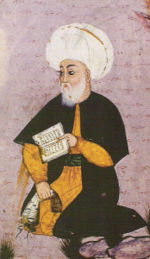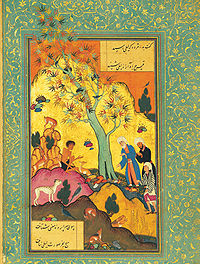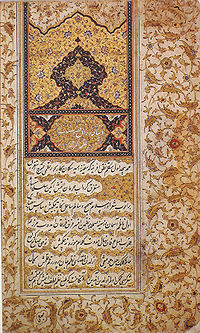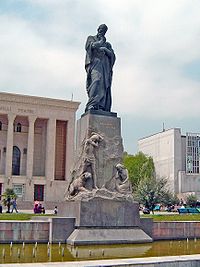- Fuzûlî
-
- For the administrative region of Azerbaijan, see Fizuli Rayon; for the city in Azerbaijan, see Füzuli.
Muhammad bin Suleyman 
Artistic rendition of FuzûlîBorn 1483 (approximate)
Karbala, Akkoyunlu, now IraqDied 1556
Karbala, Ottoman Empire, now IraqPeriod 16th century Genres Romantic Azerbaijani epic poetry, wisdom literature Notable work(s) The Epic of Layla and Majnun (Dâstân-ı Leylî vü Mecnûn) Fużūlī (or Fuduli, فضولی; Azerbaijani: Füzuli, c. 1483 – 1556) was the pen name of the Azerbaijani[1][2][3] or the Bayat branch of Oghuz Turkish[4][5][6] and Ottoman poet, writer and thinker Muhammad bin Suleyman (محمد بن سليمان). Often considered one of the greatest contributors to the Dîvân tradition of Azerbaijani literature (Turkish literature),[7] Fuzûlî in fact wrote his collected poems (dîvân) in three different languages: Azerbaijani Turkic, Persian, and Arabic. Although his Turkish works are written in the Azeri dialect of Turkish, he was well-versed in both the Ottoman and the Chagatai Turkic literary traditions as well. He was also well versed in mathematics and astronomy.[8]
Contents
Life
Turkish
literatureBy category Epic tradition Orhon
Dede Korkut · KöroğluFolk tradition Ottoman era Poetry · Prose
Republican era Fuzûlî is generally believed to have been born around 1483 in what is now Iraq, when the area was under Ak Koyunlu Turkmen rule; he was probably born in either Karbalā’ or an-Najaf.[8] He is believed to belong to Bayat tribe, one of the Turkic Oghuz tribes who were related to the Ottoman Kayı clan and were scattered throughout the Middle East, Anatolia, and the Caucasus at the time[citation needed]. Though Fuzûlî's ancestors had been of nomadic origin, the family had long since settled in towns.
Fuzûlî appears to have received a good education, first under his father—who was a mufti in the city of Al Hillah—and then under a teacher named Rahmetullah.[9] It was during this time that he learned the Persian and Arabic languages in addition to his native Azerbaijani. Fuzûlî showed poetic promise early in life, composing sometime around his twentieth year the important masnavi entitled Beng ü Bâde (بنگ و باده; "Hashish and Wine"), in which he compared the Ottoman Sultan Bayezid II to hashish and the Safavid shah Ismail I to wine, much to the advantage of the latter.
One of the few things that is known of Fuzûlî's life during this time is how he arrived at his pen name. In the introduction to his collected Persian poems, he says: "In the early days when I was just beginning to write poetry, every few days I would set my heart on a particular pen name and then after a time change it for another because someone showed up who shared the same name".[10] Eventually, he decided upon the Arabic word fuzûlî—which literally means "impertinent, improper, unnecessary"—because he "knew that this title would not be acceptable to anyone else".[11] Despite the name's pejorative meaning, however, it contains a double meaning—what is called tevriyye (توريه) in Ottoman Divan poetry—as Fuzûlî himself explains: "I was possessed of all the arts and sciences and found a pen name that also implies this sense since in the dictionary fuzûl (ﻓﻀﻮل) is given as a plural of fazl (ﻓﻀﻞ; 'learning') and has the same rhythm as ‘ulûm (ﻋﻠﻮم; 'sciences') and fünûn (ﻓﻨﻮن; 'arts')".[12]
In 1534, the Ottoman sultan Süleymân I conquered the region of Baghdad, where Fuzûlî lived, from the Safavid Empire. Fuzûlî now had the chance to become a court poet under the Ottoman patronage system, and he composed a number of kasîdes, or panegyric poems, in praise of the sultan and members of his retinue, and as a result, he was granted a stipend. However, owing to the complexities of the Ottoman bureaucracy, this stipend never materialized. In one of his best-known works, the letter Şikâyetnâme (شکايت نامه; "Complaint"), Fuzûlî spoke out against such bureaucracy and its attendant corruption:
- سلام وردم رشوت دگلدر ديو آلمادىلر
- Selâm verdim rüşvet değildir deyü almadılar.[13]
- I said hello, but they didn't accept as it wasn't a bribe.
Though his poetry flourished during his time among the Ottomans, the loss of his stipend meant that, materially speaking, Fuzûlî never became secure. In fact, most of his life was spent attending upon the Shi`ite Tomb of `Alî in the city of an-Najaf, south of Baghdad.[14] He died during a plague outbreak in 1556, in Karbalā’, either of the plague itself or of cholera.
Works
Fuzûlî has always been known, first and foremost, as a poet of love. It was, in fact, a characterization that he seems to have agreed with:
- مندن فضولی ايستمه اشعار مدح و ذم
- من عاشقام هميشه سوزوم عاشقانه دیر
- Menden Fuzûlî isteme eş'âr-ı medh ü zem
- Men âşıkam hemîşe sözüm âşıkânedür[15]
- Don't ask Fuzûlî for poems of praise or rebuke
- I am a lover and speak only of love
Fuzûlî's notion of love, however, has more in common with the Sufi idea of love as a projection of the essence of God—though Fuzûlî himself seems to have belonged to no particular Sufi order—than it does with the Western idea of romantic love. This can be seen in the following lines from another poem:
- عاشق ايمش هر ن وار ﻋﺎﻝﻢ
- ﻋلم بر قيل و قال ايمش آنجق
- ‘Âşık imiş her ne var ‘âlem
- ‘İlm bir kîl ü kâl imiş ancak[16]
- All that is in the world is love
- And knowledge is nothing but gossip
The first of these lines, especially, relates to the idea of wahdat al-wujūd (وحدة الوجود), or "unity of being", which was first formulated by Ibn al-‘Arabī and which states that nothing apart from various manifestations of God exists. Here, Fuzûlî uses the word "love" (عاشق ‘aşk) rather than God in the formula, but the effect is the same.
In Fuzûlî's œuvre, his most extended treatment of this idea of love is in the long poem Dâstân-ı Leylî vü Mecnun (داستان ليلى و مجنون), a mesnevî which takes as its subject the classical Middle Eastern love story of Layla and Majnun. In his version of the story, Fuzûlî concentrates upon the pain of the mad lover Majnun's separation from his beloved Layla, and comes to see this pain as being of the essence of love:
- یا رب بلای عشق ايله قيل آشنا منى
- بیر دم بلای عشقدن ایتمه جدا منى
- آز ايلمه عنایتونى اهل دردن
- يعنى كی چوخ بلالره قيل مبتلا منى
- Yâ Rab belâ-yı ‘aşk ile kıl âşinâ meni
- Bir dem belâ-yı ‘aşkdan etme cüdâ meni
- Az eyleme ‘inâyetüni ehl-i derdden
- Ya‘ni ki çoh belâlara kıl mübtelâ meni[17]
- Oh God, let me know the pain of love
- Do not for even a moment separate me from it
- Do not lessen your aid to the afflicted
- But rather, make lovesick me one among them
The ultimate value of the suffering of love, in Fuzûlî's work, lies in that it helps one to approach closer to "the Real" (al-Haqq الحق), which is one of the 99 names of God in Islamic tradition.
Memory
In honor of Fizuli named:
- Street and square in the center of Baku, as well as the streets in many other cities of Azerbaijan;
- District and city in Azerbaijan.
- Villages Füzuli in Shamkir and Füzuli in Samukh regions of Azerbaijan.
- Institute of Manuscripts. M. Fizuli in Baku.
- Boarding school them. M. Fuzuli in Ordubad district of Azerbaijan.
Selected bibliography
Works in Azeri
- Dîvân ("Collected Poems")
- Beng ü Bâde (بنگ و باده; "Hashish and Wine")
- Hadîkat üs-Süedâ (حديقت السعداء; "Garden of Pleasures")
- Dâstân-ı Leylî vü Mecnûn (داستان ليلى و مجنون; "The Epic of Layla and Majnun")
- Risâle-i Muammeyât (رسال ﻤﻌﻤيات; "Treatise on Riddles")
- Şikâyetnâme (شکايت نامه; "Complaint")
Works in Persian
- Dîvân ("Collected Poems")
- Anîs ol-qalb (انیس القلب; "Friend of the Heart")
- Haft Jâm (هفت جام; "Seven Goblets")
- Rend va Zâhed (رند و زاهد; "Hedonist and Ascetic")
- Resâle-e Muammeyât (رسال ﻤﻌﻤيات; "Treatise on Riddles")
- Sehhat o Ma'ruz (صحت و معروض; "Health and Sickness")
Works in Arabic
- Dîvân ("Collected Poems")
- Matla' ul-İ'tiqâd (مطلع الاﻋﺘﻘﺎد; "The Birth of Faith")
Legacy
According to the Encyclopædia Iranica:
“ Fuzuli is credited with some fifteen works in Arabic, Persian, and Azerbaijani, both in verse and prose. Although his greatest significance is undoubtedly as a Turkish poet, he is also of importance to Persian literature thanks to his original works in that language (indeed, Persian was the language he preferred for his Shi'ite religious poetry); his Turkic adaptations or translations of Persian works; and the inspiration he derived from Persian models for his Turkic works. ... The fundamental gesture of Fozuli's poetry is inclusiveness. It links Azeri, Turkmen and Ottoman (Rumi) poetry, east and west; it also bridges the religious divide between Shiism and Sunnism. Generations of Ottoman poets admired and wrote responses to his poetry; no contemporary canon can bypass him.
” Honours
In 1959, the a town and the associated rayon in Azerbaijan were renamed after him.[18]
In 1996 the National Bank of Azerbaijan minted a golden 100 manat and a silver 50 manat commemorative coins dedicated to the 500th anniversary of Fuzûlî's life and activities.[19]
References
Primary
- Fuzulî. Fuzulî Divanı: Gazel, Musammat, Mukatta' ve Ruba'î kısmı. Ed. Ali Nihad Tarlan. İstanbul: Üçler Basımevi, 1950.
- Fuzulî. Leylâ ve Mecnun. Ed. Muhammet Nur Doğan. ISBN 975-08-0198-9.
Secondary
- Andrews, Walter G. "Fuzûlî" in Ottoman Lyric Poetry: An Anthology. pp. 235–237. ISBN 0-292-70472-0.
- "Fozuli, Mohammad b. Solayman". Encyclopædia Iranica. Retrieved 25 August 2006.
- "Fuzuli, Mehmed bin Süleyman." Encyclopædia Britannica. 2006. Encyclopædia Britannica Premium Service. 23 Aug. 2006 <http://www.britannica.com/eb/article-9035730>.
- Kudret, Cevdet. Fuzuli. ISBN 9751020166.
- Şentürk, Ahmet Atillâ. "Fuzûlî" in Osmanlı Şiiri Antolojisi. pp. 280–324. ISBN 975-08-0163-6.
Notes
- ^ Encyclopædia Iranica. G. Doerfer. Azeri Turkish
- ^ Encyclopædia Iranica. H. Javadi and K. Burill. Azeri Literature
- ^ A. M. A Shushtery. Outlines of Islamic Culture - Volume I: Historical and Cultural Aspects. READ BOOKS, 2007. ISBN 1406741132, 9781406741131, p. 130
- ^ Muhammed Fuzuli
- ^ Britannica online
- ^ Kathleen R. F. Burrill, The Quatrains of Nesimi, Fourteenth-century Turkic Hurufi, Mouton, 1973,[page needed]
- ^ "Fuzuli, Mehmed bin Süleyman" in Encyclopædia Britannica
- ^ a b "Fozuli, Mohammad b. Solayman" in Encyclopaedia Iranica
- ^ Şentürk 281
- ^ Quoted in Andrews, 236.
- ^ Ibid.
- ^ Ibid.
- ^ Kudret 189
- ^ Andrews 237
- ^ Tarlan 47
- ^ Kudret 20
- ^ Leylâ ve Mecnun 216
- ^ Great Soviet Encyclopedia. Fizuli (town in Azerbaijan SSR).
- ^ Central Bank of Azerbaijan. Commemorative coins. Coins produced within 1992-2010: Gold and silver coins dedicated to memory of Mahammad Fuzuli. – Retrieved on 25 February 2010.
External links
- Muhammed Fuzuli—a website with a brief biography and translated selections from Leyla and Mecnun
- FUZULİ
- Fuzûlî in Stanford J. Shaw's History of the Ottoman Empire and Modern Turkey
Turkish Literature Folk Aşık Mahzuni Şerif · Âşık Veysel Şatıroğlu · Dadaloğlu · Erzurumlu Emrah · Gevheri · Hacı Bektaş-ı Veli · Karacaoğlan · Kaygusuz Abdal · Nasreddin · Neşet Ertaş · Pir Sultan Abdal · Seyrani · Yunus EmreMedieval and
OttomanImadaddin Nasimi · Fuzûlî · Bâkî · Nef‘î · Nedîm · Şeyh Gâlib · Evliya Çelebi · Kâtib Çelebi · Yirmisekiz Mehmed Çelebi · Aşık Çelebi · Ziya Pasha · Şemsettin Sami · Namık Kemal · Ahmed Midhat Efendi · Tevfik Fikret · Cenâb Şehâbeddîn · Halit Ziya Uşaklıgil · Ahmet Haşim · Ömer Seyfettin · Mehmet Emin Yurdakul · Ali Canip Yöntem · Mirza Habib Esfahani · Fatma Aliye TopuzContemporary Halide Edip Adıvar · Reşat Nuri Güntekin · Yakup Kadri Karaosmanoğlu · Mehmet Fuat Köprülü · Cevat Şakir Kabaağaçlı · Ahmet Hamdi Tanpınar · Orhan Kemal · Murathan Mungan · Orhan Hançerlioğlu · Samim Kocagöz · Semiha Ayverdi · Tarık Buğra · Yusuf Atılgan · Yaşar Kemal · Fakir Baykurt · Bilge Karasu · Oğuz Atay · Tomris Uyar · Ahmet Altan · Orhan Pamuk · Elif Şafak · Memduh Şevket Esendal · Kenan Hulusi Koray · Sait Faik Abasıyanık · Kemal Tahir · Haldun Taner · Aziz Nesin · Suut Kemal Yetkin · Sabahattin Ali · Kemal Bilbaşar · Cemil Meriç · Ruşen Eşref Ünaydın · Nurullah Ataç · Behçet Necatigil · Necati Cumalı · Ayfer Tunç · Yekta Kopan · Ahmet Kutsi Tecer · Şevket Süreyya Aydemir · Mehmet Emin Yurdakul · Ziya Gökalp · Orhan Veli Kanık · Oktay Rıfat Horozcu · Melih Cevdet Anday · Nazım Hikmet · Rıfat Ilgaz · Cemal Süreya · İlhan Berk · Turgut Uyar · Edip Cansever · Ece Ayhan Çağlar · Sezai Karakoç · Tevfik Akdağ · Ülkü Tamer · Neyzen Tevfik · Ahmet Haşim · Yahya Kemal Beyatlı · Abdülhak Şinasi Hisar · Orhan Seyfi Orhon · Enis Behiç Koryürek · Halit Fahri Ozansoy · Yusuf Ziya Ortaç · Muammer Lütfi Bakşi · Necip Fazıl Kısakürek · Vasfi Mahir Kocayürek · Sabri Esat Siyavuşgil · Cevdet Kudret · Yaşar Nabi Nayır · Ahmet Muhip Dıranas · Cahit Sıtkı Tarancı · Ziya Osman Saba · Faik Baysal · Salah Birsel · Özdemir Asaf · N. Abbas Sayar · Can Yücel · Attilâ İlhan · Güven Turan · İsmet Özel · Cem Uzungüneş · Mehmet Altun · Mehmet Erte · Küçük İskender · Faruk Nafiz Çamlıbel · Fazıl Hüsnü Dağlarca · Yusuf Atılgan · Murat Gülsoy · Ayşe Kulin · Yılmaz OnayPersian literature Old Middle Ayadgar-i Zariran · Counsels of Adurbad-e Mahrspandan · Dēnkard · Book of Jamasp · Book of Arda Viraf · Karnamak-i Artaxshir-i Papakan · Cube of Zoroaster · Dana-i_Menog_Khrat · Shabuhragan of Mani · Shahrestanha-ye Eranshahr · Bundahishn · Greater Bundahishn · Menog-i Khrad · Jamasp Namag · Pazand · Dadestan-i Denig · Zadspram · Sudgar Nask · Warshtmansr · Zand-i Vohuman Yasht · Drakht-i Asurig · Bahman Yasht · Shikand-gumanic VicharClassical 900s–1000sRudaki · Abu-Mansur Daqiqi · Ferdowsi (Shahnameh) · Abu Shakur Balkhi · Bal'ami · Rabia Balkhi · Abusaeid Abolkheir (967–1049) · Avicenna (980–1037) · Unsuri · Asjadi · Kisai Marvazi · Ayyuqi1000s–1100sBābā Tāher · Nasir Khusraw (1004–1088) · Al-Ghazali (1058–1111) · Khwaja Abdullah Ansari (1006–1088) · Asadi Tusi · Qatran Tabrizi (1009–1072) · Nizam al-Mulk (1018–1092) · Masud Sa'd Salman (1046–1121) · Moezi Neyshapuri · Omar Khayyām (1048–1131) · Fakhruddin As'ad Gurgani · Ahmad Ghazali · Hujwiri · Manuchehri · Ayn-al-Quzat Hamadani (1098–1131) · Uthman Mukhtari · Abu-al-Faraj Runi · Sanai · Banu Goshasp · Borzu-Nama · Afdal al-Din Kashani · Abu'l Hasan Mihyar al-Daylami · Mu'izzi · Mahsati Ganjavi1100s–1200sHakim Iranshah · Suzani Samarqandi · Ashraf Ghaznavi · Faramarz Nama · Shahab al-Din Suhrawardi (1155–1191) · Adib Sabir · Am'aq · Najm-al-Din Razi · Attār (1142–c.1220) · Khaghani (1120–1190) · Anvari (1126–1189) · Faramarz-e Khodadad · Nizami Ganjavi (1141–1209) · Fakhr al-Din al-Razi (1149–1209) · Kamal al-din Esfahani · Shams Tabrizi (d.1248)1200s–1300sAbu Tahir Tarsusi · Najm al-din Razi · Awhadi Maraghai · Shams al-Din Qays Razi · Baha al-din Walad · Nasīr al-Dīn al-Tūsī · Baba Afdal al-Din Kashani · Fakhr al-din Araqi · Mahmud Shabistari (1288–1320s) · Abu'l Majd Tabrizi · Amir Khusro (1253–1325) · Saadi (Bustan / Golestān) · Bahram-e-Pazhdo · Zartosht Bahram e Pazhdo · Rumi · Homam Tabrizi (1238–1314) · Nozhat al-Majales · Khwaju Kermani · Sultan Walad1300s–1400sIbn Yamin · Shah Ni'matullah Wali · Hafez · Abu Ali Qalandar · Fazlallah Astarabadi · Nasimi · Emad al-Din Faqih Kermani1400s–1500sUbayd Zakani · Salman Sawaji · Hatefi · Jami · Kamal Khujandi · Ahli Shirzi (1454–1535) · Fuzûlî (1483–1556) · Baba Faghani Shirzani1500s–1600sVahshi Bafqi (1523–1583) · 'Orfi Shirazi1600s–1700sSaib Tabrizi (1607–1670) · Kalim Kashani · Hazin Lāhiji (1692–1766) · Saba Kashani · Bidel Dehlavi (1642–1720)1700s–1800sNeshat Esfahani · Forughi Bistami (1798–1857) · Mahmud Saba Kashani (1813–1893)Contemporary PoetIran· Ali Abdolrezaei · Ahmadreza Ahmadi · Mehdi Akhavan-Sales · Hormoz Alipour · Qeysar Aminpour · Mohammadreza Aslani · Aref Qazvini · Manouchehr Atashi · Mahmoud Mosharraf Azad Tehrani · Mohammad-Taqi Bahar · Reza Baraheni · Simin Behbahani · Hushang Ebtehaj · Bijan Elahi · Parviz Eslampour · Parvin E'tesami · Forough Farrokhzad · Hossein Monzavi · Hushang Irani · Iraj Mirza · Bijan Jalali · Siavash Kasraie · Esmail Khoi · Shams Langeroodi · Mohammad Mokhtari · Nosrat Rahmani · Yadollah Royaee · Tahereh Saffarzadeh · Sohrab Sepehri · Mohammad-Reza Shafiei Kadkani · Mohammad-Hossein Shahriar · Ahmad Shamlou · Manouchehr Sheybani · Nima YooshijAfghanistanNadia Anjuman · Wasef Bakhtari · Raziq Faani · Khalilullah Khalili · Youssof Kohzad · Massoud Nawabi · Abdul Ali Mustaghni
TajikistanSadriddin Ayni · Farzona · Iskandar Khatloni · Abolqasem Lahouti · Gulrukhsor Safieva · Loiq Sher-Ali · Payrav Sulaymoni · Mirzo TursunzodaUzbekistanPakistanIndiaNovelAli Mohammad Afghani · Ghazaleh Alizadeh · Bozorg Alavi · Reza Amirkhani · Mahshid Amirshahi · Reza Baraheni · Simin Daneshvar · Mahmoud Dowlatabadi · Reza Ghassemi · Houshang Golshiri · Aboutorab Khosravi · Ahmad Mahmoud · Shahriyar Mandanipour · Abbas Maroufi · Iraj PezeshkzadShort StoryJalal Al-e-Ahmad · Yousef Alikhani · Kourosh Asadi · Shamim Bahar · Sadeq Chubak · Simin Daneshvar · Nader Ebrahimi · Ali-Moraf Fadaeenia · Ebrahim Golestan · Houshang Golshiri · Sadegh Hedayat · Bahram Heydari · Mohammad-Ali Jamalzadeh · Aboutorab Khosravi · Mostafa Mastoor · Jaafar Modarres-Sadeghi · Houshang Moradi Kermani · Bijan Najdi · Shahrnush Parsipur · Gholam-Hossein Sa'edi · Bahram Sadeghi · Goli TaraqqiPlayReza Abdoh · Mirza Fatali Akhundzadeh · Hamid Amjad · Bahram Bayzai · Mohammad Charmshir · Alireza Koushk Jalali · Hadi Marzban · Bijan Mofid · Hengameh Mofid · Abbas Na'lbandian · Akbar Radi · Pari Saberi · Mohammad YaghoubiScreenplaySaeed Aghighi · Mohammadreza Aslani · Rakhshan Bani-E'temad · Bahram Bayzai · Hajir Darioush · Pouran Derakhshandeh · Asghar Farhadi · Bahman Farmanara · Hamid Farrokhnezhad · Farrokh Ghaffari · Behrouz Gharibpour · Bahman Ghobadi · Fereydun Gole · Ebrahim Golestan · Ali Hatami · Hossein Jafarian · Abolfazl Jalili · Ebrahim Hatamikia · Abdolreza Kahani · Varuzh Karim-Masihi · Samuel Khachikian · Abbas Kiarostami · David Mahmoudieh · Majid Majidi · Mohsen Makhmalbaf · Dariush Mehrjui · Reza Mirkarimi · Hengameh Mofid · Rasoul Mollagholipour · Amir Naderi · Jafar Panahi · Kambuzia Partovi · Rasul Sadr Ameli · Mohammad Sadri · Parviz Shahbazi · Sohrab Shahid-SalessOthersDehkhoda ·Contemporary Persian and Classical Persian are the same language, but writers since 1900 are classified as contemporary. At one time, Persian was a common cultural language of much of the non-Arabic Islamic world. Today it is the official language of Iran, Tajikistan and one of the two official languages of Afghanistan.Categories:- Ottoman Turks
- Ottoman poets
- Azerbaijani poets
- Ottoman divan poets
- Ottoman literature
- 1480s births
- 1556 deaths
- Iraqi Shi'a Muslims
Wikimedia Foundation. 2010.



